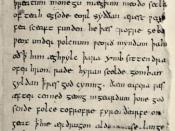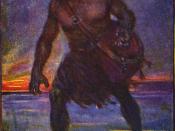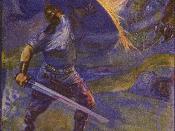Sometime around 700 A.D., in England, an unknown Anglo-Saxon scop wrote a great song about heroes, monsters, and fate. This story is called Beowulf, and is the earliest known piece of English writing. It tells of fantastic monsters, larger-than-life heroes, and treasures beyond belief. In it, a young Geat warrior-prince named Beowulf decides to help a neighboring country led by king Hrothgar rid itself of a giant monster, named Grendel. Grendel had plagued Denmark for over twelve years, murdering the Danes in their sleep. Beowulf fights an epic battle against Grendel, finally ripping off his arm, sending him to his death. He is then faced with the wrath of Grendel's mother, and defeats her as well in an underground cavern. Fifty years later, he is a king ruling his own country, when a dragon begins ravishing it. Beowulf, like in his earlier years, faces the dragon with a small group of his own people.
Upon seeing the dragon, all but one flees, leaving Beowulf to fight for himself. In the fight, he is mortally wounded, yet manages to kill the dragon. Beowulf is a story based on the conception of what a model citizen should be and how they should act. [It incorporates character foils to show how to act, the theme of the generous sharing of wealth, and the characters realizing that they are each resigned to their own fates.] Many of these themes and ideals hold true to this day, showing us that the Anglo-Saxons truly were the first of the English people.
Throughout the epic, various character foils are offered to show the way citizens in Anglo-Saxon times were expected to act. Each one illustrates a different moral valued by the Anglo-Saxons. The first one we notice is the contrast between Beowulf and Unferth. Whereas Unferth serves...



...
simple and uneducated
1 out of 1 people found this comment useful.